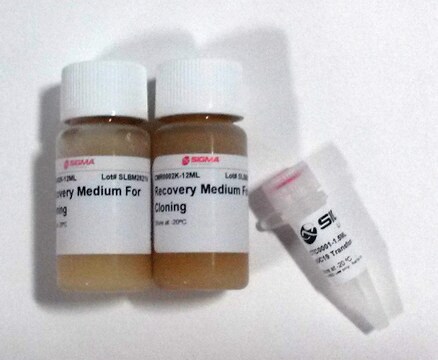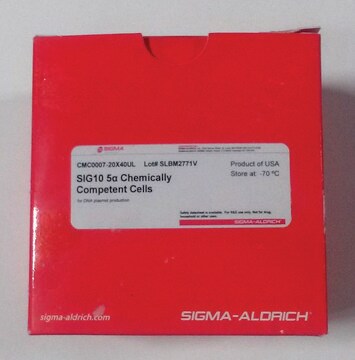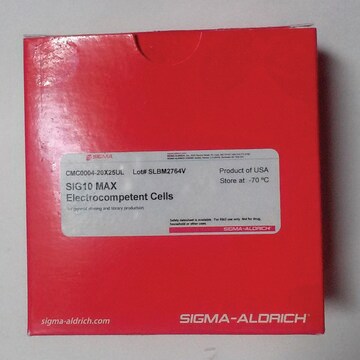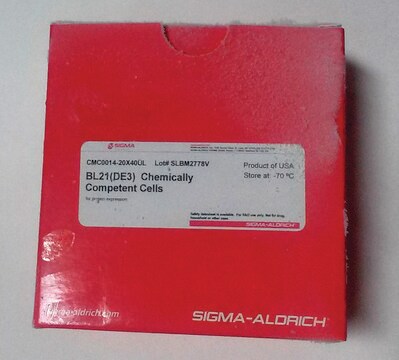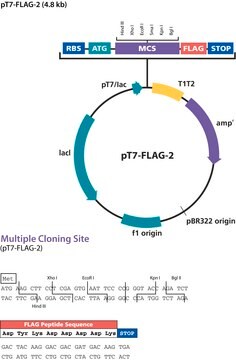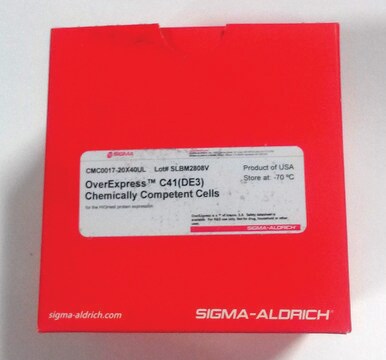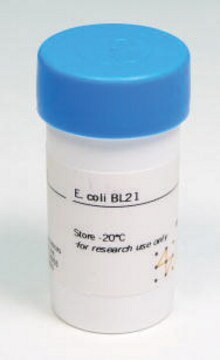CMC0001
SIG10 Chemically Competent Cells
Escherichia coli, rod shaped
Synonyme(s) :
Chemically competent E. coli, Competent bacterial cells
About This Item
Produits recommandés
product name
SIG10 Chemically Competent Cells, for protein expression and DNA plasmid production
Source biologique
Escherichia coli
Qualité
for molecular biology
Forme
buffered aqueous solution
Mode de croissance
adherent or suspension
Morphologie
rod shaped
Technique(s)
microbiological culture: suitable
Transformation cellulaire
competent cell type: chemically competent
transformation efficiency: ≥1 × 109 cfu/μg
Conditions d'expédition
dry ice
Température de stockage
−70°C
Catégories apparentées
Description générale
These cells are ideal for cloning and propagation of plasmid, cosmid, or fosmid clones and are highly efficient for routine cloning applications.
They share the most useful genetic elements of standard cloning strains like DH5α™ DH10B, JM109, TOP10, etc. and directly replace them in cloning protocols.
They are are provided in 40 μL, 80 μL and 160 μL aliquots, each being sufficient for one, two and four transformations respectively.
The cells have a transformation efficiency of >1 x 109 cfu/μg
The 96-well format are provided in aliquots of 20 μL per well and have a transformation efficiency of >1 x 108 cfu/μg.
Genotype
F- mcrA Δ(mrr-hsdRMS-mcrBC) endA1 recA1 Φ80dlacZΔM15 ΔlacX74 araD139 Δ(ara,leu)7697 galU galK rpsL nupG λ- tonA
Application
Caractéristiques et avantages
- share the most useful genetic elements of standard cloning strains like DH5α™ DH10B, JM109, TOP10, etc. and directly replace them in cloning protocols.
- ensures recovery of stable and high quality plasmid DNA.
- high transformation efficiency
- provide the performance researchers need with ease of use.
- provide solutions for a wide range of applications at economical prices.
- Blue - white screening
Composants
- SIG10 chemically competent cells
- pUC 19 transformation control DNA at 10 pg/μL
- recovery medium for cloning
Principe
This strain also carries the recA1 and endA1 mutations. The recA1 genotype provides minimized recombination and aids in plasmid stability while endA1 provides for high quality plasmid DNA preparation.
They are bacteriophage T1-resistant (tonA mutation) and also resistant to streptomycin by virtue of rpsL mutation.
Informations légales
Produit(s) apparenté(s)
Code de la classe de stockage
10 - Combustible liquids
Certificats d'analyse (COA)
Recherchez un Certificats d'analyse (COA) en saisissant le numéro de lot du produit. Les numéros de lot figurent sur l'étiquette du produit après les mots "Lot" ou "Batch".
Déjà en possession de ce produit ?
Retrouvez la documentation relative aux produits que vous avez récemment achetés dans la Bibliothèque de documents.
Articles
Colony PCR reagents and our colony PCR protocol using REDExtract-N-Amp™ PCR ReadyMix™ and JumpStart™ REDTaq® PCR ReadyMix™ reagents.
Bacterial transformation is a process of horizontal gene transfer by which some bacteria take up foreign genetic material (naked DNA) from the environment. Bacteria that can take up free, extracellular genetic material are known as competent cells.
Protocoles
For best results, ligation reactions must be heat inactivated at 70º C for 15 minutes before transformation. Alternately, the reactions may be purified.
Notre équipe de scientifiques dispose d'une expérience dans tous les secteurs de la recherche, notamment en sciences de la vie, science des matériaux, synthèse chimique, chromatographie, analyse et dans de nombreux autres domaines..
Contacter notre Service technique